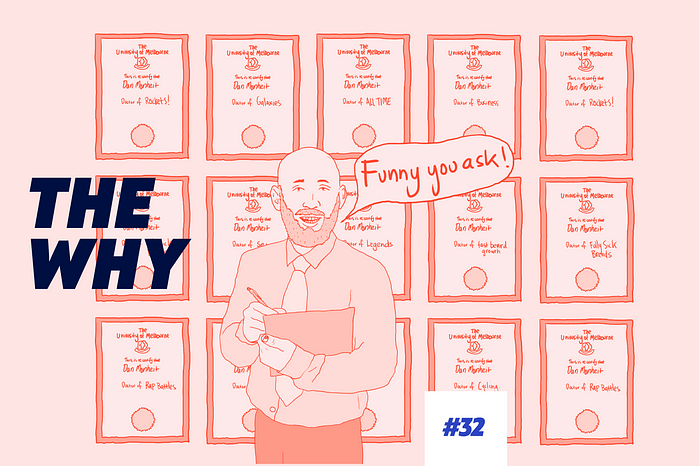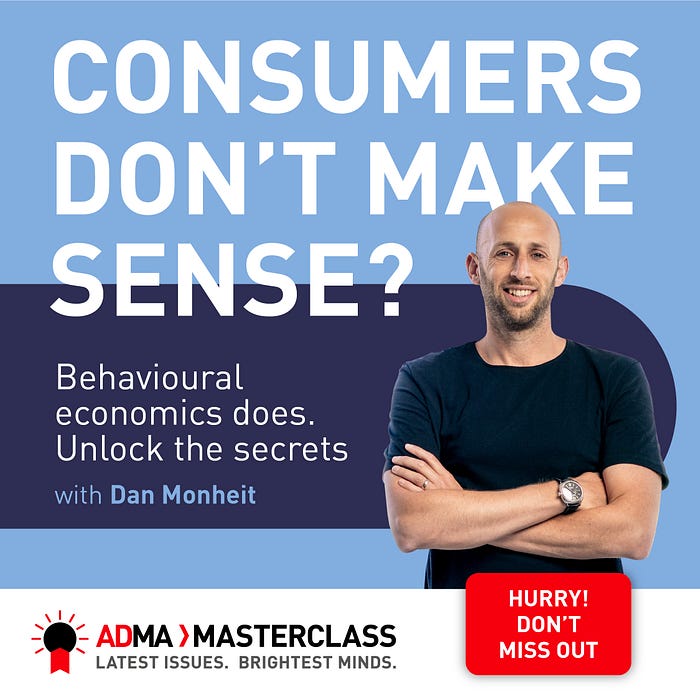By Dan Monheit, 12.11.21
Question submitted by Dan, Prahran

Thanks for your question, me. And may I say it has come at the right time. After some deep self-reflection on the horse milk saga of edition #31, I have found myself wondering how it all came to this. $140 car washes. Too many pairs of sweatpants. Persistent burritos. Yes, the world can be a confusing place, but so confusing that people are asking moi?
Let’s get real. I’m just a guy with a newsletter you very probably definitely knowingly signed up for. Sure, I’ve got a few thousand subscribers, a successful creative agency, one helluva podcast and a guy on the books whose illustrations are chefs kiss 🤌, but I’m no Dr Phil.
Thankfully, there is a behavioral bias that makes it all clear, which is lucky, because with great eDM databases comes great responsibility.
Authority Bias
The Authority Bias refers to our tendency to attribute greater weight and trustworthiness to the opinions of people with actual, or perceived authority. This authority can be achieved through fame, status, hierarchy, qualification, wealth or other means (e.g. the aforementioned excellent illustrations).
To prove it, let’s take a trip back to 1961, when Yale University psychologist Stanley Milgram conducted one of the most controversial social experiments of all time. Participants were recruited, partnered together and ‘randomly’ assigned the role of ‘teacher’ or ‘learner’ (when in reality, all ‘learners’ were confederates working for Milgram).
Each teacher was separated from their learner and brought into a room equipped with an electric shock generator and a row of switches ranging from 15 volts (marked as `Slight Shock’) all the way up to 450 volts (marked as ‘Danger: Severe Shock’).
An experimenter wearing a lab coat instructed the teachers to ask a series of questions to the learner (who was out of sight but within earshot), and to administer an electric shock of increasing intensity each time a learners’ answer was incorrect. Unfortunately for our teachers, the learners gave many, many incorrect answers.
Of course, the learners weren’t actually being zapped. They weren’t even connected to the electricity, but the teachers had no idea. Every time they pulled the lever to administer a shock, they heard (pre-recorded) cries of pain that became more and more intense. As the situation escalated many of the teachers were visibly distressed and wanted to stop administering shocks, but the experimenter would pressure them by saying things like “the experiment requires you to continue.’’
The SHOCKing result? Every participant continued shocking up to a level of 300 volts (😖), while an incredible 65% (two-thirds) continued all the way to the highest shock level possible (☠️☠️☠️).
So why on earth would a bunch of seemingly regular people zap the crap out of a stranger just because a guy with a clipboard told them to? In short, because that’s what we’re taught to do from the moment we’re born.
Teachers and parents are constantly telling us to follow the rules (or suffer the consequences), which shapes our perspective on which voices to listen to and trust.
As we grow older, this extends to other authority figures including police officers, politicians, doctors, bosses, celebrities, corporations, and even a strange man named Dan on the internet. As long as there are cues to indicate trust — a lab coat, a certification, a newsletter or a Behavioural Economics Masterclass, we’re all ears.

For brands that already are an authority, keep leading from the front. For those that are yet to reach the dizzying heights, the solution may lie in attaching yourself to authorities in whatever attribute you’re seeking to convey. Usain Bolt talking about speed? Authority. Dentists endorsing your new brand of chewing gum? Authority. A shiny award from Choice? Authority.
Behaviourally Yours,
PS If you missed the last edition, you can still check out why we don’t drink horse milk here.

Bad Decisions Podcast
Learn more about the Authority Bias on episode 34 of the Bad Decisions podcast.

Got a question?
Is there something you’ve always wondered about?
Send it through to AskDan@hardhat.com.au

Want more?
Learn from THE authority in Behavioural Economics. Last chance to join ADMA’s Behavioural Economics Masterclass, hosted by the very same Dan who wrote this email, kicking off on Tuesday. Sign up here!

